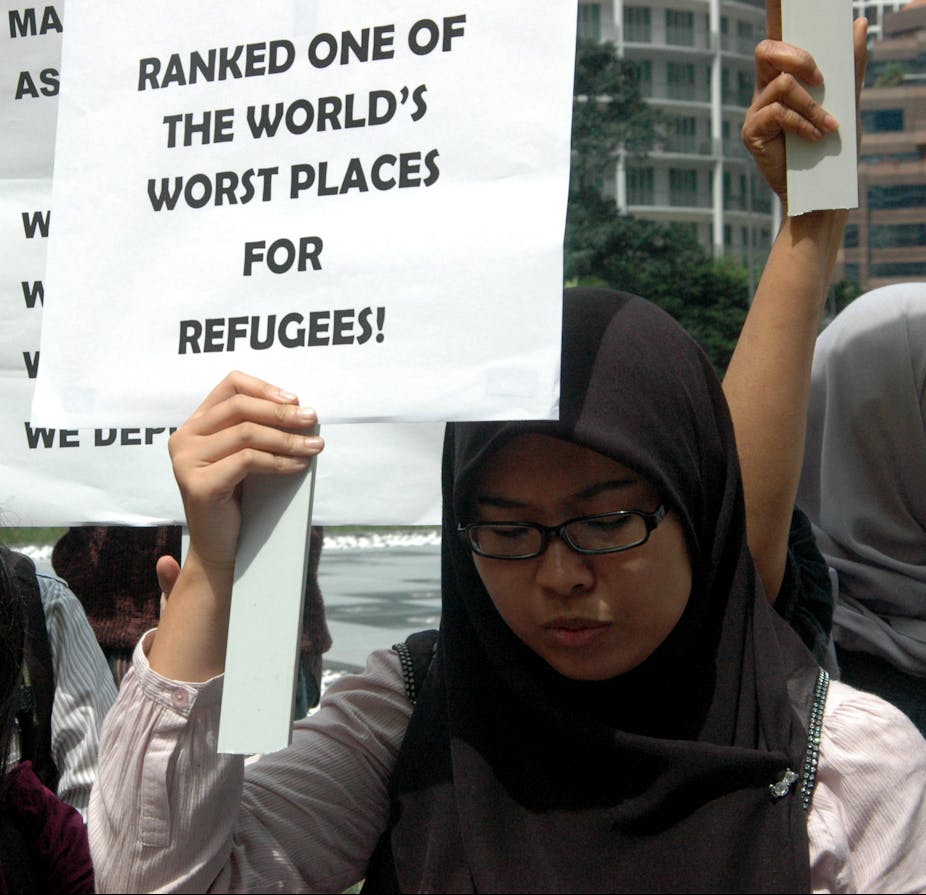On Monday, Australia and Malaysia signed a deal that will mean 800 refugees that have arrived in Australia will be swapped with 4,000 verified refugees from Malaysia.
This deal from both Australian and Malaysian perspectives seems mind boggling. For Australia, if the policy is not implemented properly and human rights of refugees are seen to be abused then Julia Gillard’s Labor government will face political disaster. For Malaysia, it’s out of character with its long-term foreign policy of limited engagement and could embarass the nation by putting a global spotlight on Malaysia’s terrible human rights record.
How the refugee deal fits in with Malaysia’s foreign policy strategy
The current Malaysian prime minister, Najib Razak has a clear strategy when it comes to foreign policy. Firstly, to improve his personal international profile to compensate for declining domestic popularity. And secondly to directly improve Malaysia’s economic fortunes by convincing international investors & entrepreneurs to invest in Malaysia.
But there are serious implications to Najib’s strategy. Malaysia is very gradually moving away from its long-held position of non-alignment and limited engagement towards a tighter alliance with the US and two of its closest allies in the region – Singapore and Australia.
Under Najib, Malaysia’s relationship with the U.S., Australia and Singapore is the closest ever. The number of difficult deals that Najib has delivered with these countries has made him appear to be an important asset.
One perspective is that Malaysia has opted to resolve the refugee matter at the bilateral level rather than through regional (Bali process) or multilateral (UN) channels. But also the refugee swap deal falls into this broader trend of raising Najib’s international profile.
A puzzling policy
But what is puzzling is the fact that Najib would accept this trade-off between a higher profile for himself among government leaders for public humiliation. It is inevitable that due to the intense media scrutiny around this deal, Malaysia’s atrocious human rights record will be put under the spot light.
If this is the principle reason Malaysia signed such a deal, then whose objectives were really being considered – Najib’s personal needs or the country?
Another theory is that the generous payments from the Australian government maybe trickling in to companies related to the ruling regime. The Australian government will need to make public who are the beneficiary companies from this deal.
A history of immigrant tensions
The Malaysian authorities and a large number of Malaysians treat refugees, as well as legal and illegal migrant workers very poorly. As Malaysia has a large informal working sector, a large unregulated formal sector, and a large illegal immigrant population – they are often blamed for all of society’s woes, particularly rising crime and decreasing wages.
The refugee community gets trapped in this conflict. Add to this enforcement agencies that are laws to themselves in a society where corruption and extortion are rampant. There are frequent needless deaths, injuries and humiliation in immigrant communities.
A high level of racism
Racism is pervasive in Malaysia. The most blatant and the most dangerous is the state sponsored racism by the ruling party (UMNO) who works within a coalition of 13 other parties (who are predominantly race or ethnic based).
The UMNO have a privileged position above the law, and intentionally cause division and hatred. And at this present time, there is none more guilty than prime minister Najib Razak.
Human rights problems affect everyone
The concerns expressed by international human rights groups are justified. Malaysia’s history of human rights is simply atrocious. This is despite the fact Malaysia is an upper middle-income economy with aspirations to become a high-income economy by 2020.
The decline in human rights in Malaysia is a broad based problem – one that not only affects refugees and immigrants (legal and illegal) but also Malaysians in general. Even with a cursory glance at any of the international ranking reports from Human Rights Watch, Amnesty International, Reporters Without Borders, Freedom House, Trafficking In Persons Report, and the US Department of State, one can see there is nothing favourable to say.
How can Malaysia protect others when it can’t protect its own citizens?
Malaysia’s democratic institutions have been severely compromised over the years, reaching its zenith during former primer minister, Mahathir bin Mohamad’s tenure. Violence against individuals by state law enforcement agencies have been legitimised and enabling these agencies to believe they can act with impunity.
Furthermore, in Malaysia, lives in general do not have much value let alone the lives of migrants & refugees. The number of deaths from traffic accidents and the number of deaths at public facilities are all on the rise.
It’s difficult to see how the human rights of these 800 refugees to be transfered from Australia can be protected when they will be integrated into the Malaysian community. They will be vulnerable to state agencies who are corrupt, violent and antagonistic towards immigrant communities. Even if the refugees were in a privately run detention centre, they may indeed have more freedom than in the streets of Malaysia, or at least they would be safer.
Gillard’s disaster would be a blip on Malaysia’s radar
Having said that, Australia will have a very strong incentive to make this deal work. If Malaysia fails to hold up its side of the bargain, it would be a political disaster of biblical proportions for the Gillard administration
Meanwhile, this is a non-issue in domestic Malaysian politics. In general, foreign policy does not concern Malaysians much unless its related to Islamic issues, particularly the situation in Palestine, and treatment of Muslims in general.
As noted earlier, Malaysians in general have a low opinion of migrant labour and so, they tend to treat migrant workers refugees poorly. Hence, this deal has not and I believe will not gain political traction. Although, the opposition has opposed this deal on principled grounds and pointing to Malaysia’s atrocious human rights record – it is not one of the issues that will cause sleepless nights for the ruling party.

